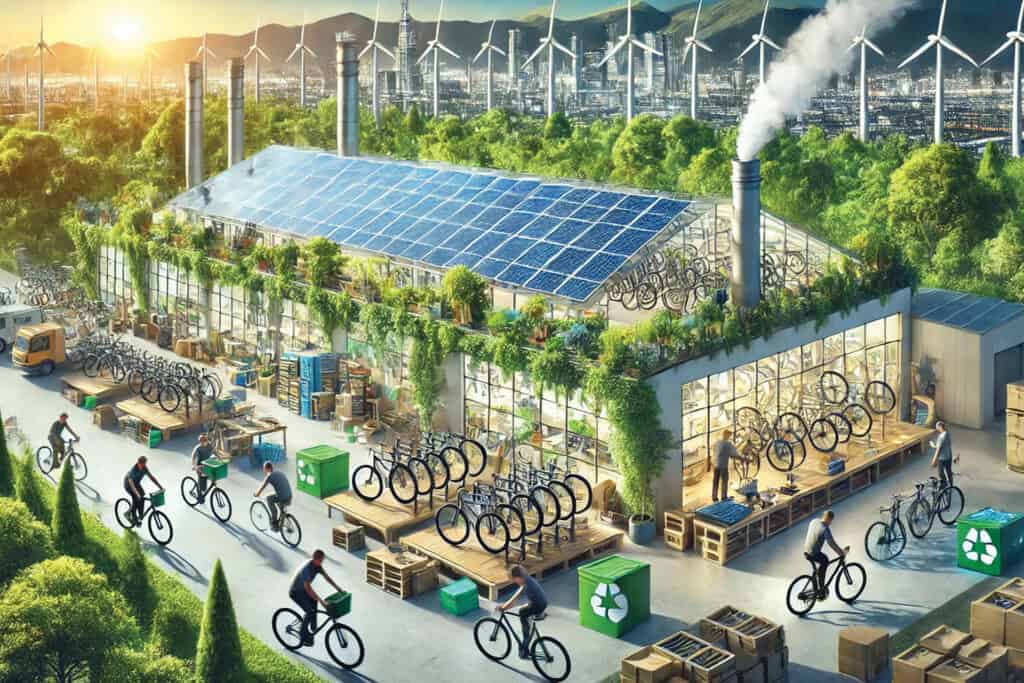Sustainability remains a top priority in the bicycle industry. The Show Daily has compiled an overview of the latest developments.

From manufacturers to brands to bike retailers, sustainability is a central issue for the bicycle industry, spanning the entire supply chain. This focus was also reflected at this year’s Taipei Cycle Show; at the exhibition booths, in show-related keynote speeches and at events organized by various industry organizations. Among them, the Taiwanese Bicycling Alliance for Sustainability (BAS) once again hosted its exclusive ESG Global Initiative Forum at the Taipei Cycle Show. Last year, the event was held to bring together decision-makers from the global bicycle industry to discuss sustainability efforts in the sector. This time, a three-hour program is once again planned, featuring presentations on the latest achievements of the Bicycling Alliance for Sustainability as well as the introduction of a dedicated Human Rights Code of Conduct. The goal? To advance the sustainable development of the cycling industry in alignment with ESG principles.
This high-profile initiative by the Taiwanese industry organization appeared to come at just the right moment since the latest developments suggest that sustainability in the bicycle industry is at a crossroads. On one side, the ongoing economic downturn is pushing many companies to the brink, forcing them into stringent cost-saving measures. On the other, new regulations demand stricter reporting, customers expect greater transparency, and investors are prioritizing long-term stability—brands that fail to take action risk falling behind. In Taiwan, suppliers are under especially strong pressure to align with the sustainability requirements of European manufacturers, while in Europe, businesses are adapting to increasingly stringent CO2 reduction goals. Despite all the challenges, experts agree that sustainability is no longer optional for the industry.

Looking Long-term
“Sustainability is a marathon, not a sprint,” comments Sebastian Olenyi, an experienced sustainability consultant who works with his German agency, Sustentio, with several high-profile clients in the bicycle industry. “Despite all the challenges, the bicycle industry must recognize that sustainability is not a trend but a fundamental shift,” he says. “Therefore, ignoring the topic is no longer an option. With increasing regulatory pressure and consumer awareness, businesses that hesitate, risk falling behind—not just in compliance, but in overall market relevance,” he continues, citing an example: “Just look at Tesla—controversial behavior at the leadership level has led to a significant backlash when it comes to sales. Businesses today have no choice but to take their responsibility seriously—or they risk losing both trust and revenue.”

While the bicycle industry has largely avoided major scrutiny, Tesla’s recent stock market nosedive serves as a warning of the risks businesses face when failing to address sustainability and ethical concerns. Neither The Telegraph’s 2023 report on labor abuse at a Malaysian Shimano supplier nor Le Monde’s February 2025 investigation into questionable working conditions in Taiwanese factories has caused much of a stir. “The bicycle sector has been relatively lucky up until now,” Olényi observes. However, he issues a warning: “Many companies are in the same boat—when scandals break, they can hit multiple manufacturers at once. To stay competitive in the long run, businesses must address the evolving regulatory landscape and consumer concerns.”
How Bike Companies Embrace Responsibility
The good news is the bicycle industry has made significant strides in recent years. Today’s ESG Global Initiative Forum is just one example of how more industry leaders are embracing their responsibility. Many factories have started working on reducing their energy consumption and emissions. More brands are integrating recycled aluminum and researching carbon recycling solutions. Many are making an efforts to lower transportation emissions by manufacturing closer to key markets. Closed-loop manufacturing is increasingly becoming a focus, and battery recycling programs and sustainable packaging initiatives are also expanding. This is reflected in the increasing number of sustainability reports, published by more and more bicycle companies, detailing advancements in CO2 reduction, greater supply chain transparency and improved social standards.
“It’s true. In the last two or three years, we’ve seen numerous new sustainability reports in the cycling industry,” confirms Erik Bronsvoort, co-founder of the organizations Circular Cycling and Shift Cycling Culture, and a sustainability expert who has been observing the sustainability ambitions in the cycling sector for many years. “One reason is certainly the increasing political pressure. Regulations like the European Union’s Corporate Sustainability Reporting Directive force larger companies to engage more deeply with sustainability reporting and their supply chains. Another reason is that it’s been realized that sustainable practices don’t necessarily have to cost more but can actually save money—for example, through energy savings. However, the most important reason is that companies have recognized that reporting gives them a better understanding of the business and where they can have the greatest impact, also in terms of innovation,” he summarizes.

Taiwan’s Bicycling Alliance for Sustainability
A promising development in recent years is the increasing cooperation between bicycle companies to tackle sustainability challenges together. Instead of each brand working in a silo, industry players are increasingly joining forces to drive meaningful change. The best example of this is the Bicycling Alliance for Sustainability (BAS), which has grown from 33 founding members in 2022 to more than 80 companies today, including prominent names like Giant and Merida. The alliance provides a platform for knowledge exchange, shared ESG goals and collective action on key sustainability issues. “At BAS, the different members work closely together and set common goals, for example, saving 25 kg CO2e per bicycle by 2040,” explains Jeff Chen. The General Manager of Novatec (the wheel brand of Joy Industrial) is Vice Chairman of BAS and, therefore, one of the driving forces behind the organization’s ambitions. “At our latest industry forum, for example, we discussed using eco-friendly alloys and new recycling technologies for carbon fiber. Many of our members are making real progress, and we will continue supporting them in reaching their sustainability goals.”

An overview of the latest developments shows that the road to sustainability in the bicycle industry remains challenging, but the momentum is undeniable. While challenges such as economic pressure or setbacks such as the media reports on dodgy working conditions in factories persist, more decision-makers seem to understand that sustainability is no longer a luxury—it is a necessity. From regulatory compliance to shifting consumer expectations, companies that fail to act risk falling behind in an increasingly competitive landscape. Therefore, collaboration, transparency and innovation will be key in shaping a greener future for cycling. “Sustainability is not about short-term gains—it’s about long-term resilience,” emphasizes Sebastian Olényi. “The brands that invest in responsible practices today will be the ones leading the market in the future.”
Topics in this article
More news and updates from The Show Daily team
- Bicycle Industry Sustainability Progress: Green Products Here to Stay
- SKS Germany: Tradition Meets Innovation
- GW Launches Versatile New Wheelset Lineup to Address Global Market Demand
- Small Wheels, Big Footprint: Eurobike Expands Ecomobility Focus
- Greenway Battery: A Focus on Product Longevity and Smart Sustainability


